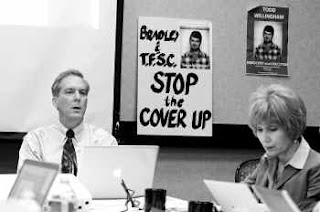The Texas Forensic Science Commission will devote the entire January 7, 2011 meeting to the case of Todd Willingham. They are scheduled to hear testimony from arson experts, including Craig Beyler. The hearing starts at 9:30 AM, but members of Texas Moratorium Network, Campaign to End the Death Penalty, Texas Death Penalty Abolition Movement and others plan to be outside the building at 8:30 AM with signs.
The hearing is in the Central Services Building, 1711 San Jacinto Boulevard Room 402 in Austin. We will go inside before the hearing starts. RSVP on the Facebook event page. The Innocence Project will show the meeting live on its website.
There will likely be a period devoted to receiving comments from the public. We invite members of the public to show up, bring signs and even make comments during the public comments period to let the Commission know that Texans Todd Willingham was wrongfully executed and that Texas should stop all executions through a moratorium on executions.
Before his execution, Todd Willingham said, “Please don’t ever stop fighting to vindicate me.”
More on the meeting from the Austin American-Statesman:
The Texas Forensic Science Commission will hear from four fire investigation experts Friday as it continues to examine the science used to convict and execute Cameron Todd Willingham.The special meeting in Austin, postponed from November, was sought by the commission’s scientists to help them answer two key questions:








